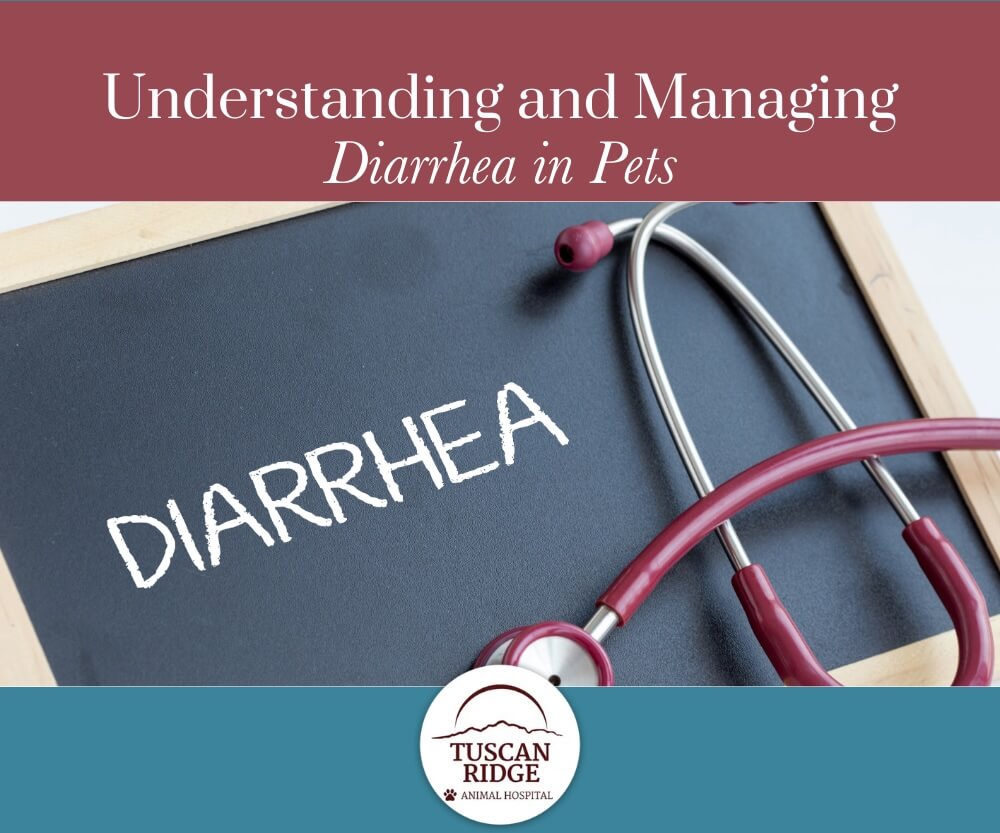 At Tuscan Ridge Animal Hospital, we understand that seeing your beloved pet suffer from diarrhea can be distressing. This common issue can range from a minor inconvenience to a serious health concern, depending on its cause and duration.
At Tuscan Ridge Animal Hospital, we understand that seeing your beloved pet suffer from diarrhea can be distressing. This common issue can range from a minor inconvenience to a serious health concern, depending on its cause and duration.
In this blog post, we will explore the causes, symptoms, treatment options, and preventive measures for diarrhea in pets. Additionally, we will provide a comprehensive Q&A section to address some frequently asked questions.
Causes of Diarrhea in Pets
Diarrhea in pets can be caused by various factors, including:
- Dietary Indiscretion: Eating spoiled food, garbage, or non-food items.
- Dietary Changes: Switching pet food brands or introducing new foods too quickly.
- Food Allergies or Intolerances: Sensitivity to certain ingredients in their diet.
- Infections: Bacterial, viral, or parasitic infections.
- Medications: Antibiotics or other drugs can disrupt the gut flora.
- Stress or Anxiety: Changes in environment, routine, or exposure to stressful situations.
- Underlying Health Conditions: Diseases such as inflammatory bowel disease, pancreatitis, or liver disease.
- Toxins: Ingesting toxic substances, such as certain plants, chemicals, or human medications.
Symptoms of Diarrhea in Pets
Common symptoms of diarrhea in pets include:
- Loose or watery stools
- Increased frequency of bowel movements
- Urgency to defecate
- Straining during bowel movements
- Blood or mucus in the stool
- Loss of appetite
- Dehydration
- Lethargy
Treatment Options
The treatment for diarrhea in pets depends on the underlying cause. Here are some general guidelines:
- Fasting: Withholding food for 12-24 hours can help rest the digestive system. Ensure your pet has access to fresh water to prevent dehydration.
- Bland Diet: Gradually reintroduce food with a bland diet, such as boiled chicken and rice, until stools normalize.
- Hydration: Ensure your pet remains hydrated. Electrolyte solutions can be helpful.
- Medications: Probiotics, anti-diarrheal medications, or antibiotics may be prescribed by your veterinarian.
- Veterinary Care: Seek veterinary attention if diarrhea persists for more than 24-48 hours, is accompanied by vomiting, lethargy, or blood in the stool, or if your pet is very young, old, or has underlying health conditions.
Preventive Measures
To prevent diarrhea in your pets:
- Introduce dietary changes gradually.
- Avoid feeding table scraps or non-food items.
- Ensure your pet’s diet is balanced and appropriate for their age and health status.
- Keep your pet’s environment clean and free of toxins.
- Regularly deworm and vaccinate your pet.
- Minimize stress and provide a stable routine.
Q&A Section
Q1: What should I do if my pet has diarrhea?
A: Initially, withhold food for 12-24 hours and ensure they have access to fresh water. If diarrhea persists or is accompanied by other symptoms, consult your veterinarian.
Q2: Can I give my pet over-the-counter anti-diarrheal medication?
A: Always consult your veterinarian before giving any medication to your pet, as some human medications can be toxic to animals.
Q3: When should I be concerned about my pet’s diarrhea?
A: If diarrhea lasts more than 24-48 hours, is severe, or is accompanied by vomiting, lethargy, or blood in the stool, seek veterinary care.
Q4: Can stress cause diarrhea in pets?
A: Yes, stress or anxiety can cause diarrhea in pets. Try to minimize stressful situations and provide a calm, stable environment.
Q5: How can I prevent my pet from getting diarrhea?
A: Gradually introduce dietary changes, avoid feeding inappropriate foods, keep their environment clean, and ensure they are regularly dewormed and vaccinated.
Q6: Can diarrhea be a sign of a serious health condition?
A: Yes, diarrhea can be a symptom of underlying health issues such as infections, inflammatory bowel disease, or organ disease. Persistent or severe diarrhea should be evaluated by a veterinarian.
Q7: What should I feed my pet after a bout of diarrhea?
A: Start with a bland diet, such as boiled chicken and rice, and gradually reintroduce their regular food once stools normalize.
At Tuscan Ridge Animal Hospital, we are dedicated to providing the best care for your pets. If you have any concerns about your pet’s health, please do not hesitate to contact us. Our experienced veterinarians are here to help your furry friends stay happy and healthy.
